These days it stays sunny later. I turn from the blue light of my computer to face our bookshelf and take the same picture again.
Before it goes down over Decarie, the sun licks each wall of our living room. It’s easy to understand sun-as-related-to-fire in this final half-hour of daylight; a buzzy golden hover over the books’ spines. I know I don’t have the skill to capture what I see. We’ve lived in our apartment for almost every season now, but the novelty hasn’t worn off, though the colours of the spines are starting to.
I try to capture the books as they find their light. I keep losing the sun.

Most days I work across the room at a wobbly wooden desk Vi-An scored off of Facebook marketplace for free. I love its bow legs and squeaky drawer. Paper accumulates around me as I keep my eyes glued to the screen of my computer, scrolling the archives of emails, slack, spreadsheets, and inventory databases. During the day I do my part to help administer the building of others’ libraries. In the process of making sure physical copies of books make it over the physical ocean and into a physical truck to a physical warehouse location all from behind this semi-real blue screen, my computer desktop becomes layered with more and more rows of temporarily relevant information. Many things attempting to be remembered. I cut time out of the end of my week to reset.
What kind of library is made up of digital detritus? This is one I keep too.

Messy messy desk! I will be embarrassed if my coworkers see this.
Looking at our bookshelf, I play a game to find places where the books are in aesthetic conversation with each other. I imagine that this light is shining on some of the most cherished books on the shelf: Leguin, Lorde, Lubrin.
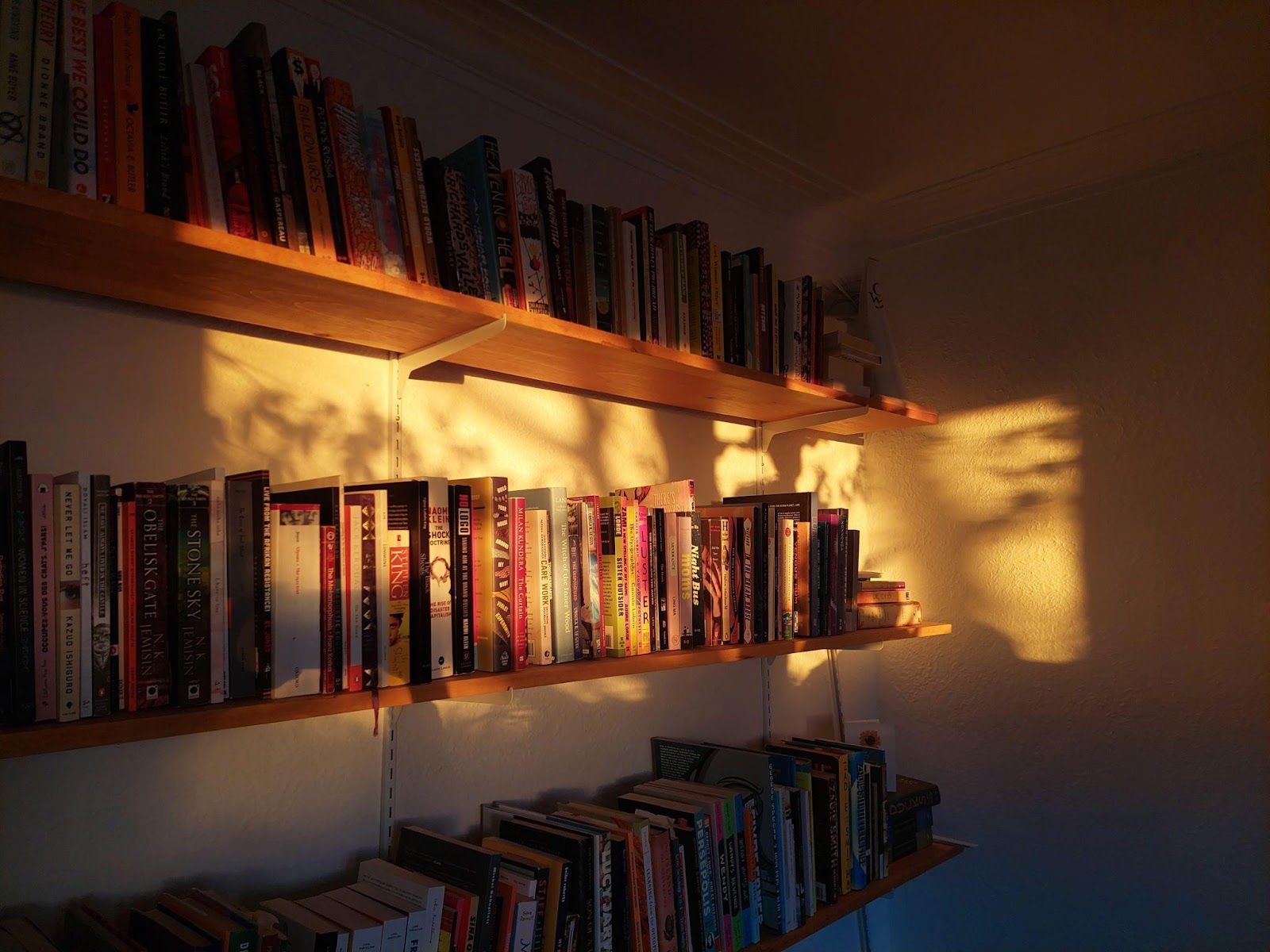
Spotlit books. Ls are at the far end of the middle shelf.
I don’t believe in a library belonging, exactly. Some of my friends’ books have a place on the shelf, as do my “own” and Vi-An’s, and the books I hold onto for Simone, my sibling, until they move back to Canada or settle down elsewhere. There were moments that repeated at one point: bell hooks’ all about love, Maggie Nelson’s Bluets, Ocean Vuong’s Night Sky With Exit Wounds, and R.C. Lewontin’s Biology as Ideology that have since been uncoupled.
A lot of the books come from my English degrees. Some of them I lost during that first year of the pandemic when I thought I was visiting family in Montreal but ended up living here—my signed copies of Jonny Appleseed and Obits, Map to the Door of No Return—books I loved so much I had to give them away for a little bit and be okay with them living only in my memory—the notes I’d written in the margins lost, or found, I guess, by someone else. They keep their places on friends’ shelves on the prairies.

I lost almost all of my pictures from Calgary when I ended up never going back in March 2020.
So much of memory lives in writing. In the overly thorough notes I made in my notebooks and textbooks knowing I’d sweat and shake when called on in class, in the journals I’ve kept on and off since childhood that helped me practice thought, voice, and self that could not yet live off the page. The transitional periods in my life are so far the most prolific: early high school and undergrad. When I am in pain or tired or busy, writing falls away to make room for survival—then it’s back to processing. I don’t know why I can’t be in my body and mind comfortably at the same time—I’m desperate not to be a mind-body duellist and have many theories about how I might reject duality in the end. The memories are stored in journals how I want to remember them, which is often different from how I remember them.

My journals 2004-2021. Vi-An’s camera library. Mrs. Lamonte, 100+ year old xmas cactus. Cat knick knack courtesy of Leila F.
My favourite type of research is the accidental kind, like when I watched Tàr, then read June Jordan, and Mahler kept making appearances. And so, a week later, my understanding of time and tempo and audacity revolutionized all over again as I traveled to Ottawa and sat across from my mother in her library-living room and noticed Spivak’s In Other Worlds which my friend had mentioned to me on the phone a few days earlier. I’d used one essay in my thesis, which became the half-drowned. I was pushed backwards. My eyes shifted: above my mother’s head was a mini grandfather clock that doesn’t tell time. We disagreed about whether the person who could fix it was called a clocksmith (her suggestion) or an horologist (mine). It was happening again—we’ve never had an argument that was different in essence than the one we were having in that moment. I thought about another clock, my Dad’s inheritance from his grandmother: an antique that’s also stopped and watching from above. When I go home I write about the clocksmith/horologist argument every day for a week. It gets me nowhere. A library, like a clock, might be an attempt to mark time.
Back in Montreal, I returned to my studio where I keep no clock.
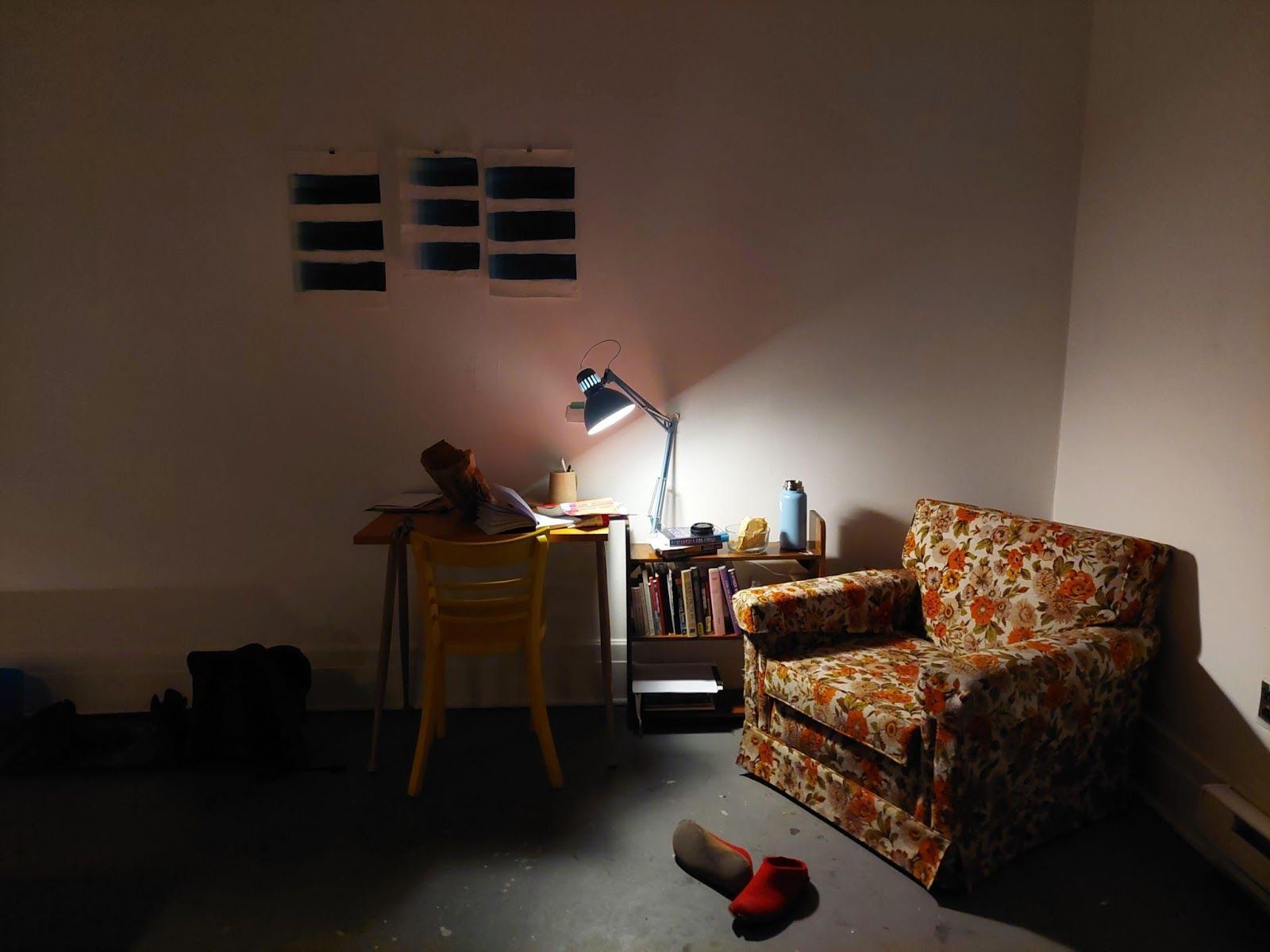
Studio corner, mid-writing session. Books hugged by labour and comfort. I brought Spivak back.
In time this library will be very different. It will become a catalogue of loss—I don’t know how many of these books will be read again. I am trying to make use of public libraries more these days, now that I don’t have to write all over the books’ pages. Sometimes (often) I long to write in the margins and dogear, so I make a purchase. Sometimes (often) it’s so long to get to what I want. I’m trying to practice patience and rest too, like these books on the walls keeping company and friendships with each other. They wait with their affinities and good humour on shelves me and Vi-An constructed and stained ourselves, in a place that is becoming more and more like home. We walk through the doorway and read the room. Then, we look away from the books and towards the sun.

Plant library facing west. Across from books. This photo was taken by Vi-An Dang.
Gallery
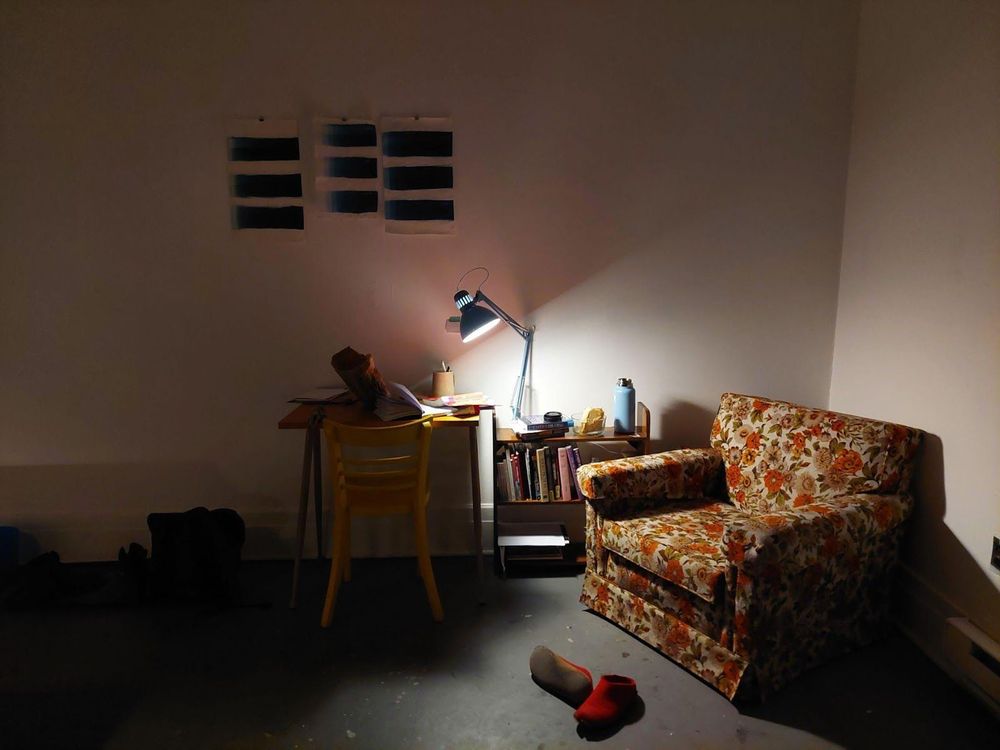
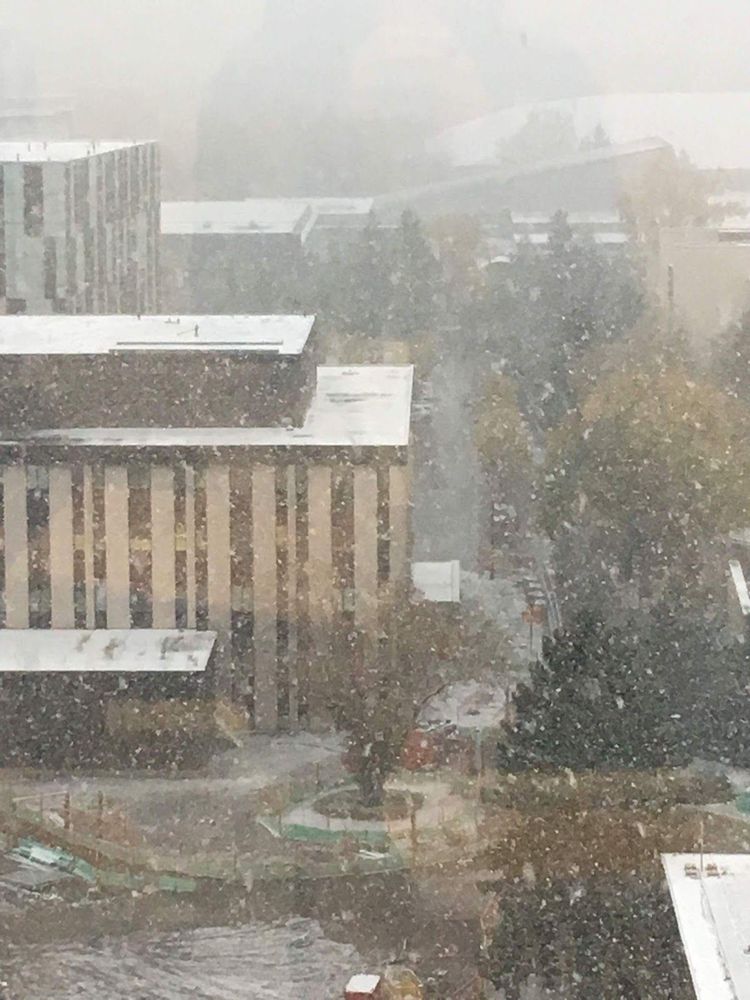
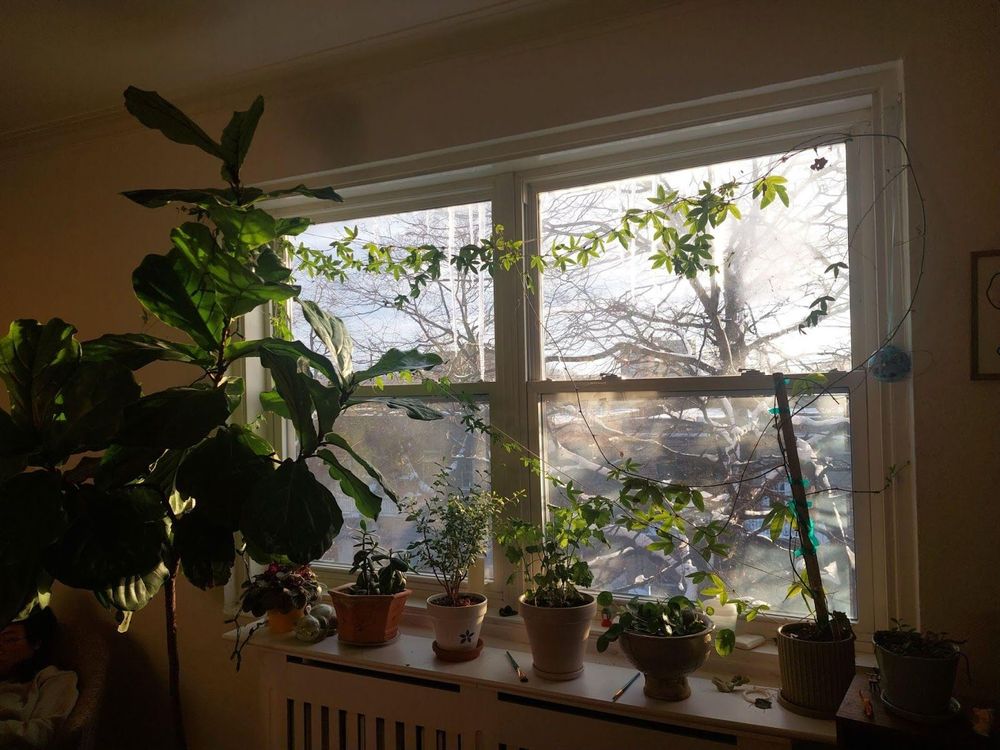
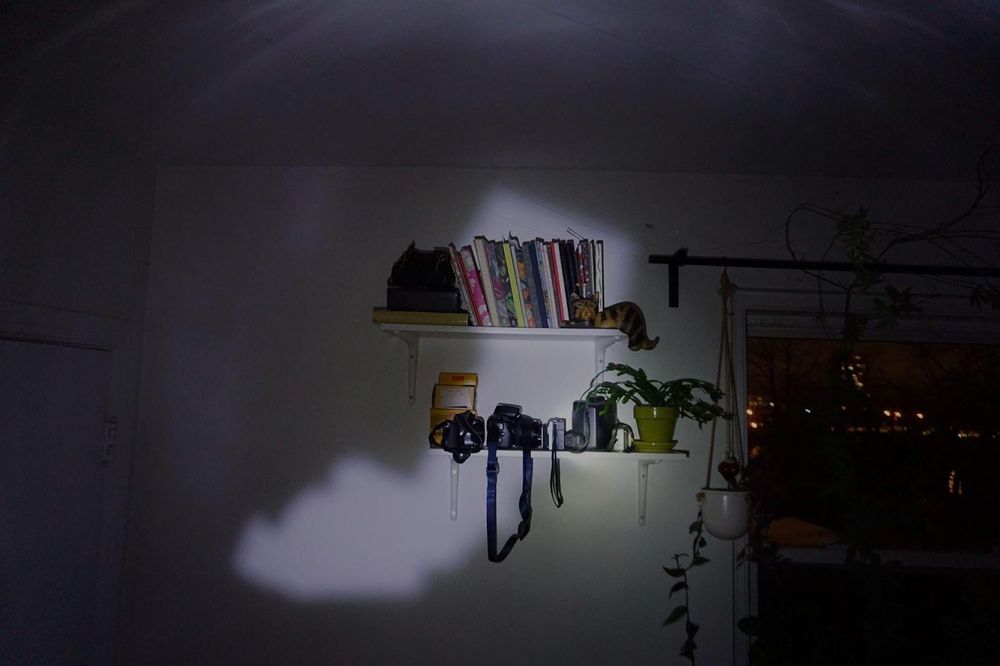
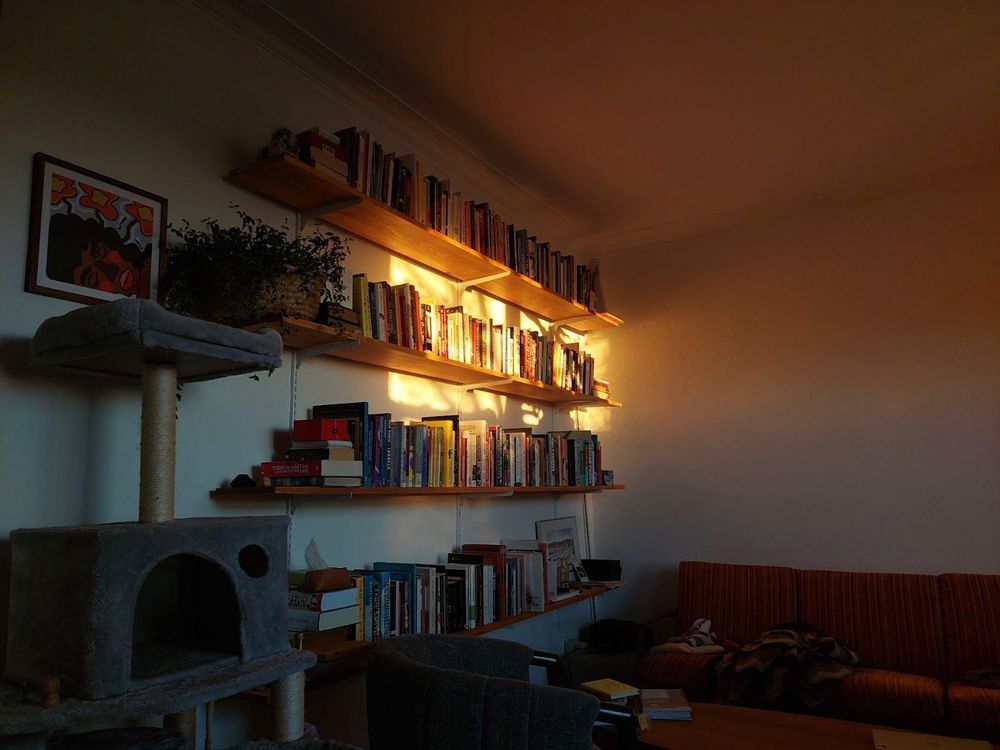
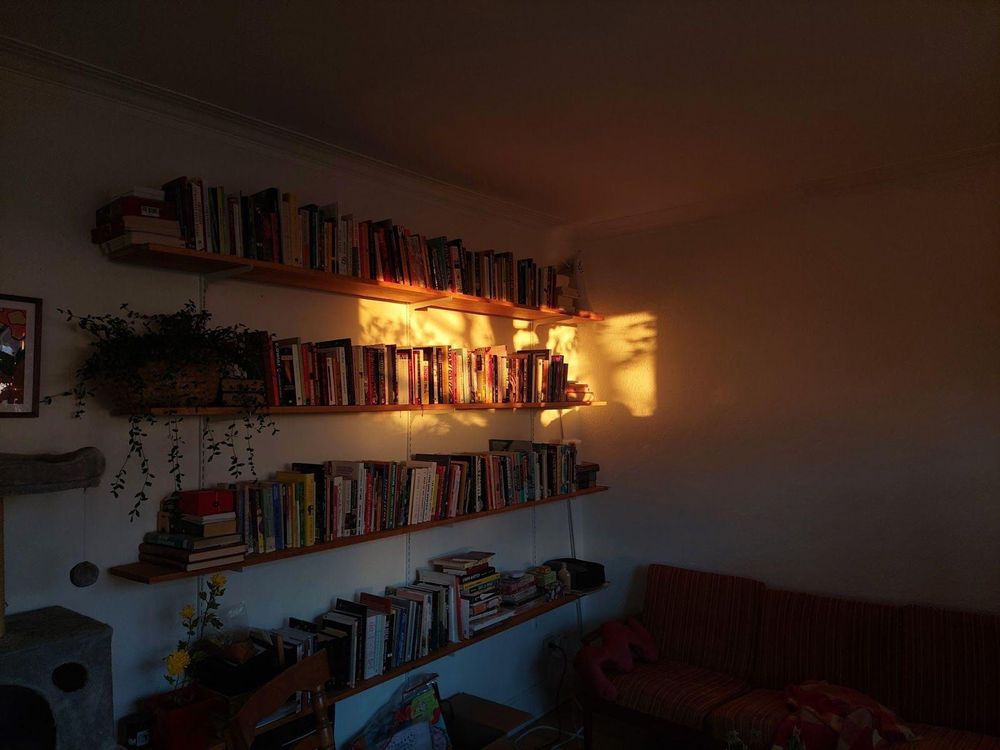
How-to-Cite
MLA
Delaney, Trynne. “Building Catalogues of Loss.” Shelf Portraits, 11 August, 2023, richlerlibrary.ca//shelf-portraits/building-catalogues-of-loss. Accessed 18 May, 2024.
APA
Delaney, Trynne. (2023, August 11). Building Catalogues of Loss. Shelf Portraits. https://richlerlibrary.ca//shelf-portraits/building-catalogues-of-loss
Chicago
Delaney, T. “Building Catalogues of Loss.” Shelf Portraits, 11 August, 2023, https://richlerlibrary.ca//shelf-portraits/building-catalogues-of-loss.
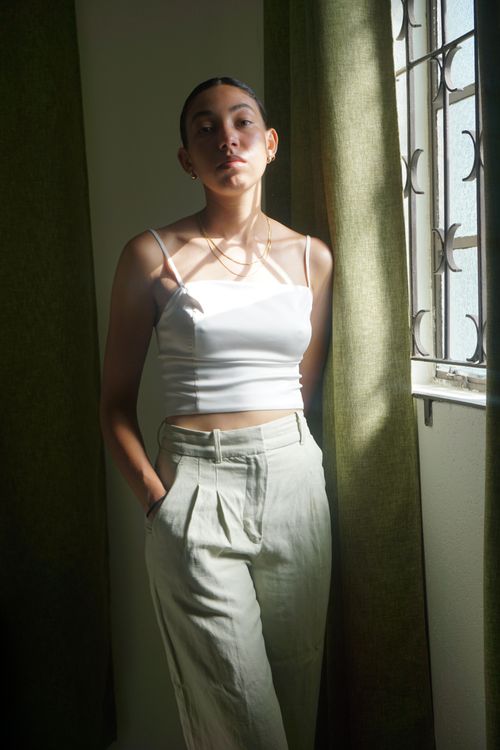
Trynne Delaney

Trynne Delaney is a writer currently based in Tiohtià:ke (Montréal). They are the author of the half-drowned (winner of the QWF First Book Prize) and A House Unsettled. In their spare time they like to garden.